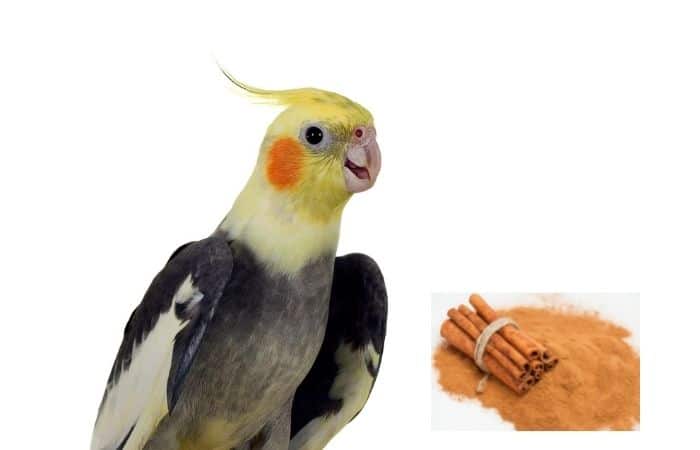Yes, because of their sweet flavor, cockatiels enjoy eating them. Cinnamon belongs to the spice family and is safe for your bird’s health and is also excellent for cockatiel digestion.
A cockatiel can consume Ceylon cinnamon, either powdered or whole-stick. It is beneficial to them, particularly if it is high-quality, organic cinnamon.
Cinnamon spices up their diet, increasing variety, and nutrition. Simply sprinkle powdered Ceylon cinnamon on top of whatever you have cooked for your cockatiel.
Cinnamon is used by some pet owners in their birdie bread or other soft foods.
Others have tried combining powdered cinnamon with hot cooked rice, barley, or lentils to please their cockatiel’s palates. This method maximizes the health benefits of the spice.
The heat from the cooked food draws out healthy oils, making them more easily absorbed by your bird’s tiny body. Cinnamon-coated rice, barley, or lentils can be mixed with other foods later, and the cinnamon will coat everything.
Organic Ceylon cinnamon is the best for your birds, and it is also the best for humans. It is widely available in most Natural Foods sections of supermarkets, as well as at stores such as Whole Foods and Sprouts.
Cockatiels cannot, however, consume Cassia/Chinese cinnamon. Cassia/Chinese cinnamon contains high levels of coumarin, a toxic blood thinner that can cause severe, even fatal, liver complications in parrots.
Many birds enjoy spicy peppers as well, but only because they can’t feel the heat. We know that birds’ taste receptors differ from those of humans.
Birds do not feel the burn because they are biologically unable to register the effects of capsaicin, the chemical that causes peppers to feel “hot” in a human’s mouth.
Is there any other way to use cinnamon with my cockatiel?
Yes, toys that stimulate multiple senses are essential for your parrot. Whole sticks of organic Ceylon cinnamon are a great toy that fits those criteria. The sticks are usually the ideal size for your cockatiel to manipulate.
The zesty aroma can pique your bird’s interest and keep it entertained for hours. Cinnamon sticks are also a safe alternative to candles when it comes to adding a delectable aroma to your home.
Some candles contain petroleum or other harmful substances that you and your parrot should avoid breathing in. Simply boil orange peels and cinnamon sticks to flagrantly fragrance a toxin-free room
What other spices do cockatiels enjoy?
Many spices are enjoyed and beneficial to a cockatiel. Cumin, chili powder, turmeric, and cayenne pepper can help your pet diet by adding nutritional value. Choosing organic spices, such as cinnamon, ensures that your bird is not exposed to potentially harmful chemicals.
Make sure there is no added salt when selecting spices; too much sodium can be harmful to cockatiels.
Cocktails can consume the following spices:
Cayenne Pepper
This spice is not only useful as a supplement, but it is also a must-have in your pet first-aid kit.
It is thought to be an anti-inflammatory and a mild pain reliever, but it is not a replacement for seeking veterinary care if your bird has injured itself. Because parrots lack taste receptors for capsaicin, the chemical that causes peppers to feel spicy and hot, they can consume cayenne pepper.
Ceylon Cinnamon
This is the only type of cinnamon that is safe for birds, and it can be given in powder form or as a chewing stick. Ceylon cinnamon contains a lot of Vitamin K, E, and potassium.
It is also antiseptic, anti-inflammatory, and high in antioxidants. Cassia cinnamon contains high levels of coumarin, a toxic blood thinner that can cause liver damage or failure, Cassia/Chinese cinnamon is not suitable for birds. Make sure your parrots are only fed Ceylon cinnamon.
Cloves
Cloves are high in vitamins such as vitamin A, vitamin C, vitamin D, vitamin E, vitamin K, and vitamins B6 and B12. They are also said to be antibacterial, anti-inflammatory, and a great immune system booster for your bird.
Ginger
You can grate ginger into your birds’ chops, give them chunks to hold, or wedge pieces through the cage bars for them to chew on. Ginger is a fantastic anti-nausea and anti-travel sickness supplement.
Anise with a Star
Birds will enjoy star anise spice as a foot toy. Star anise contains a lot of vitamin C, iron, and calcium. It is also antibacterial and high in antioxidants, all of which are beneficial to the immune system of your bird.
What kinds of herbs can cockatiel eat?
Cockatiels have a preference for aromatic herbs that are completely safe for them, such as basil, chamomile, cilantro, etc. Cockatiels enjoy the following herbs
- Chamomile: This herb is primarily used to make a soothing tea from your cockatiel. Of course, no sugar or milk in it as these are poisonous to birds, and it should be warm (20 degrees Celsius) no longer to avoid harming the bird.
- Cilantro: some cockatiels appear to enjoy coriander.
- Oregano: One of the safe herbs for your little pet is oregano.
- Rosemary: There is no evidence that rosemary is harmful to your little pet.
- Spearmint: Their strong aroma is appealing to them. According to the same owner, the entire mint plant lasted only two days. However, some bird owners advise only one leaf per day. Indeed, the high oil content of this herb can irritate their bird’s digestive tract.
- Lavender: A cockatiel can nibble on an indoor lavender herb without repercussions.
- Marjoram, lemon balm, and thyme are not on any dangerous list or database and are classified as safe in many resources.
Conclusion
Cinnamon protects your cockatiel from painful infections. Cinnamon contains antimicrobial compounds that help in the killing of bacteria and the promotion of healing. This can help in the treatment of any chronic wounds or infections that your cockatiel may be suffering from.
Finally, one of the most important cinnamon benefits is that it has anticancer and antitumor properties, which aid in the reduction of oxidative stress in the body.
